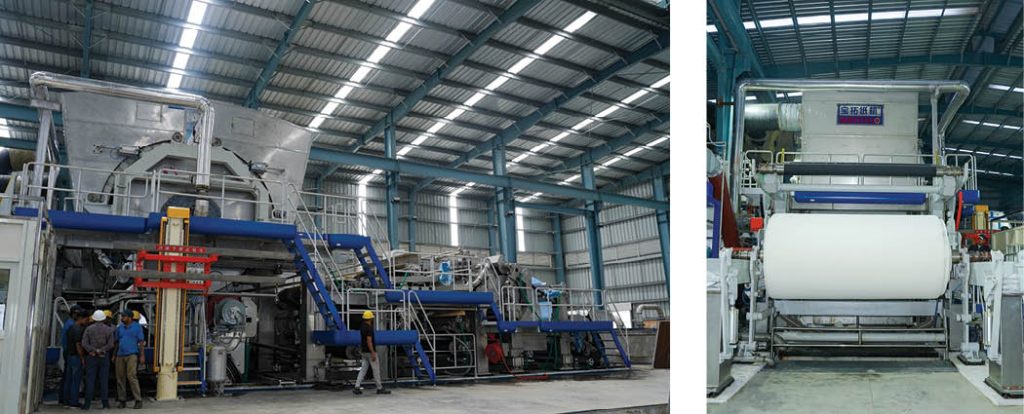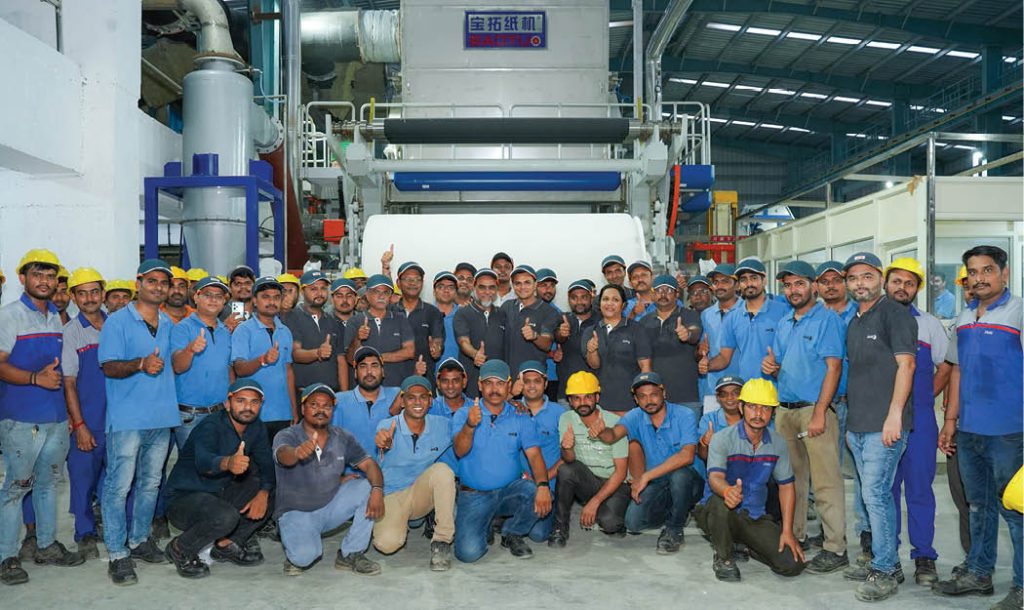Beginning as a trading company for paper & paper board products in 1979, Jani Sales has grown into a global business with its manufacturing operations across India for paper products. Today, Jani Sales trades over 3,50,000 metric tons of waste paper annually across the globe. Looking forward to a lasting future in the dynamic tissue paper markets of India, Southeast Asia, and Africa, they have launched their second tissue line in Gujarat. The PM2, operational from Q3 2024, boasts a capacity of 60 MT/day. Mr. Abiali Jani, Director, Jani Sales, said the company saw great potential in the Indian paper industry, wherein it will set up more manufacturing lines based on market requirements.

Paper Mart: Kindly highlight the 45-year-old business journey of Jani Sales, highlighting major achievements and crucial milestones.
Abiali Jani: Founded in 1979 as a small trading firm, our paper journey began with distributing kraft paper and gradually expanded into the recycled board segment in dealership with the NR Group. By the 1990s, we diversified into virgin paper grades, establishing a significant presence across India through strategic partnerships, including with ITC, and opening branch offices nationwide. As pioneers in introducing Indian paper mills to the Middle East, we successfully ventured into exports, focusing on kraft, duplex, and writing & printing grades. Our forward integration strategy led to international success, while backward integration allowed us to efficiently supply raw materials like waste paper to mills across India and the Far East.
Today, we trade over 3.5 lakh metric tons of waste paper annually across the globe. Our latest achievement, the addition of a lower GSM MG machine four years ago has positioned us as one of the largest MG machine operators in the country, with a capacity of 100 MT. We manufacture kraft paper, posters, and tissues, catering to both local and international markets. The latest addition to our portfolio is our brand new PM2 line manufacturing virgin tissue paper.
Watch: In Pursuit of Lesser Water Footprint
PM: Congratulations on the inauguration of your new tissue line at Sarigam, Gujarat. How different is PM2 from PM1, in terms of features as well as efficiency? Also share whose machinery have you relied on to set up the line.
AJ: PM1 is a state-of-the-art machine from Italian company Toscotec. The machine produces MG kraft, MG poster and MG tissue paper, with a unique emphasis on lower GSM papers targeting the paper bag industry. Particularly post-Covid, Jani Sales experienced a surge in demand from the e-commerce industry, replacing plastic with their eco-friendly paper products. The company successfully entered global markets, earning the trust of major e-commerce and paper bag industry. The technical team’s expertise allows Jani Sales to produce a vast GSM range from 18 to 100, making them a significant player in the MG machine production landscape. The company’s global expansion includes a strong presence in the Middle East, Europe, and Canada.
Jani Sales has successfully launched a brand new tissue paper line, targeting a GSM range of 11.5 to 42 GSM. This is a 100 percent pulp-based machine from China, which will manufacture facial tissue papers, toilet tissue papers, kitchen towels, and napkins. The PM2, operational from Q3 2024, boasts a capacity of 60MT/day and will cater to both domestic and international markets. With a strong export focus, Jani Sales anticipates a significant growth in the tissue industry with growing demands from the market.

Our achievement, the addition of a lower GSM MG machine has positioned us as one of the largest MG machine operators in the country, with a capacity of 100 MT.
PM: How will the increased production capacity be utilized? How will it be split between the domestic and exports market?
AJ: There’s no doubt about the potential of the global market, but I remain highly optimistic about the Indian market, which is growing steadily with increased hygiene awareness, particularly after the Covid-19 pandemic. The allocation of expanded production capacity between domestic and export markets will depend on factors such as market demand, strategic priorities, competition, and costs. Companies may prioritize the domestic market if there is strong local demand or lower distribution costs, while exports might be targeted for higher margins or growth prospects. Ultimately, the distribution will be driven by the company’s goals and current market conditions.

PM: How crucial is sustainability to your operations? Please share some of the best practices.
AJ: Sustainability is vital to paper operations, addressing environmental concerns and consumer demand for eco-friendly products. Key best practices include sourcing recycled materials to reduce reliance on virgin pulp, implementing responsible sourcing certifications like FSC and PEFC, and enhancing water & energy efficiency through recycling and renewable energy use. Companies focus on waste reduction by optimizing processes and repurposing byproducts, while also managing their carbon footprint through cleaner technologies and improved logistics. Additionally, adopting sustainable packaging solutions and innovating product development using alternative fibers can further minimize environmental impact. Engaging employees and communities in sustainability initiatives fosters a culture of responsibility. By implementing these practices, paper operations can significantly enhance their sustainability while meeting market demands.
PM: Where are your major markets and what new markets are you eyeing?
AJ: The major markets for tissue paper include North America, Europe and Asia-Pacific, with strong demand driven by hygiene awareness and disposable income. North America and Western Europe are mature markets, while China and India are rapidly growing in Asia. Latin America, the Middle East and Africa are also expanding due to urbanization and rising incomes.
New markets being targeted include India, Southeast Asia and Africa, which offer long-term growth potential, along with Eastern Europe, where modernization is increasing tissue demand. Sustainability-focused markets in Europe are also attractive for eco-friendly tissue products.
Also Read: Tirumala Venkateshwara Paper & Board Serving Paper Cutlery Industry with Barrier Coated Kraft Paper
PM: How do you manage to stay ahead of the curve? Where do you see yourself five years down the line?
AJ: The tissue paper market is a dynamic and growing segment of the global paper industry, driven by various factors such as population growth, urbanization, rising hygiene awareness and increased consumer demand for premium and eco-friendly products. The tissue market is experiencing healthy demand driven by both consumer and institutional use. While rising input costs are pushing prices higher, market competition and innovations are helping to balance it out. Long-term growth is expected, particularly in emerging economies, with sustainability playing a key role in shaping future products and production processes. We see a good potential for the coming years and are very optimistic in setting up more manufacturing lines based on market requirements.
PM: Please discuss some of the challenges you have been experiencing in the market. What policy intervention would you like to see in place to help overcome them?
AJ: The tissue and paper manufacturing industry faces several key challenges. Rising raw material costs, particularly for wood pulp and recycled fibers, are increasing production expenses. Stringent environmental regulations related to sustainability, emissions and water usage demand costly investments in cleaner technologies. Energy costs are also high, as the industry relies heavily on energy-intensive processes. Many traditional paper manufacturing plants need modernization, but smaller players face difficulties due to the significant capital expenditure involved. Additionally, the demand for traditional paper products is declining due to digitalization, while supply chain disruptions further complicate operations.
To overcome these challenges, manufacturers seek policy interventions such as government subsidies for sustainable practices, stabilization of raw material prices and financial support for plant modernization. Energy cost reduction through renewable energy incentives and improved supply chain infrastructure would also be beneficial. These interventions could help the industry become more competitive, resilient and sustainable in the long term.
Jani Sales has successfully launched a brand new tissue paper line, targeting a GSM range of 11.5 to 42 GSM. This is a 100 percent pulp-based machine, which will manufacture facial tissue papers, toilet tissue papers, kitchen towels, and napkins.




